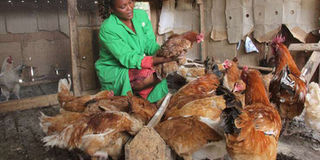Chicken odour 'prevents' malaria, shows new study

A poultry farmer tends to her chickens in Nyeri. Scientists in Ethiopia discovered that chicken odour repels malaria-causing mosquitoes. PHOTO | JOSEPH KANYI | NATION MEDIA GROUP
What you need to know:
- Scientists discovered chickens have a volatile chemical component that repels mosquitoes.
- Titled Chicken Volatiles Repel Host-Seeking Malaria Mosquitoes, the researchers tested the insects to find out what type of blood they fed on.
Malaria researchers have found that keeping a chicken by your bedside could help protect you from mosquito bites that spread malaria, shows a new study.
According to the research, the malaria-carrying mosquitoes (anopheles mosquito) are put off by the smell of certain species, including chicken.
This is because — as the scientists discovered — chickens have a volatile chemical component that repels mosquitoes.
In the study conducted in Ethiopia and published last week, the team of scientists from Addis Ababa University and Swedish University found that malarial mosquitoes tend to avoid homesteads that have chickens and other birds.
In the study, Chicken Volatiles Repel Host-Seeking Malaria Mosquitoes, the researchers tested the insects to find out what type of blood they fed on.
From their findings, they noted that malaria-causing mosquitoes, known as anopheles arabiensis, showed a taste for human blood over that of animals when feeding indoors.
TRAPS AVOIDED
However, the insects randomly fed on cattle, goats and sheep, but always steered clear of chickens when outdoors.
“The mosquitoes avoided traps placed next to cages containing live chickens and those baited with compounds from chicken feathers,” reads an excerpt from the article published in the Malaria Journal.
The experiments, conducted in western Ethiopia, included suspending a live chicken in a cage near a volunteer sleeping under a bed net.
Researchers discovered that the use of the chickens and the compounds extracted from their feathers “significantly reduced” the number of mosquitoes that were found in the trap nearby.
Last year, malaria killed nearly 400,000 people in Africa, the World Health Organisation (WHO) says.
Kenya alone records close to 4,000 malaria-related deaths annually.
Although the infection and death rates have declined over the years, health officials and researchers continue to look for new ways to cut the spread of the disease at a time when resistance to available insecticides is being reported.
SUITABLE REPELLENTS
Professor Rickard Ignell, from the Swedish University of Agricultural Sciences, said: “We were surprised to find that malaria mosquitoes are repelled by the odours emitted by chickens.”
“This study shows for the first time that malaria mosquitoes actively avoid feeding on certain animal species and that this behaviour is regulated through odour cues.”
Dr Ignell added: “There is a need to develop novel control methods. In our study, we have been able to identify a number of natural odour compounds which could repel host-seeking malaria mosquitoes and prevent them from getting in contact with people.”
Although he acknowledged that the findings are fundamental to the fight against malaria, Andrew Githeko, a chief researcher at the Kenya Medical Research Institute, warned that people should not have chicken in their bedrooms because they are unhygienic.
“What the study says is that we can explore more options to identify the specific chemical that repels the mosquito and make suitable potent repellents that are safe for use,” he said.
According to Dr Githeko, the chemical produced by the chickens which repulsed the mosquito has the potential to evaporate quickly (volatile) and thus can be detected through smell.
(Editing by Joel Muinde and Henry Gekonde)





